Retrospect AI Scientific Day
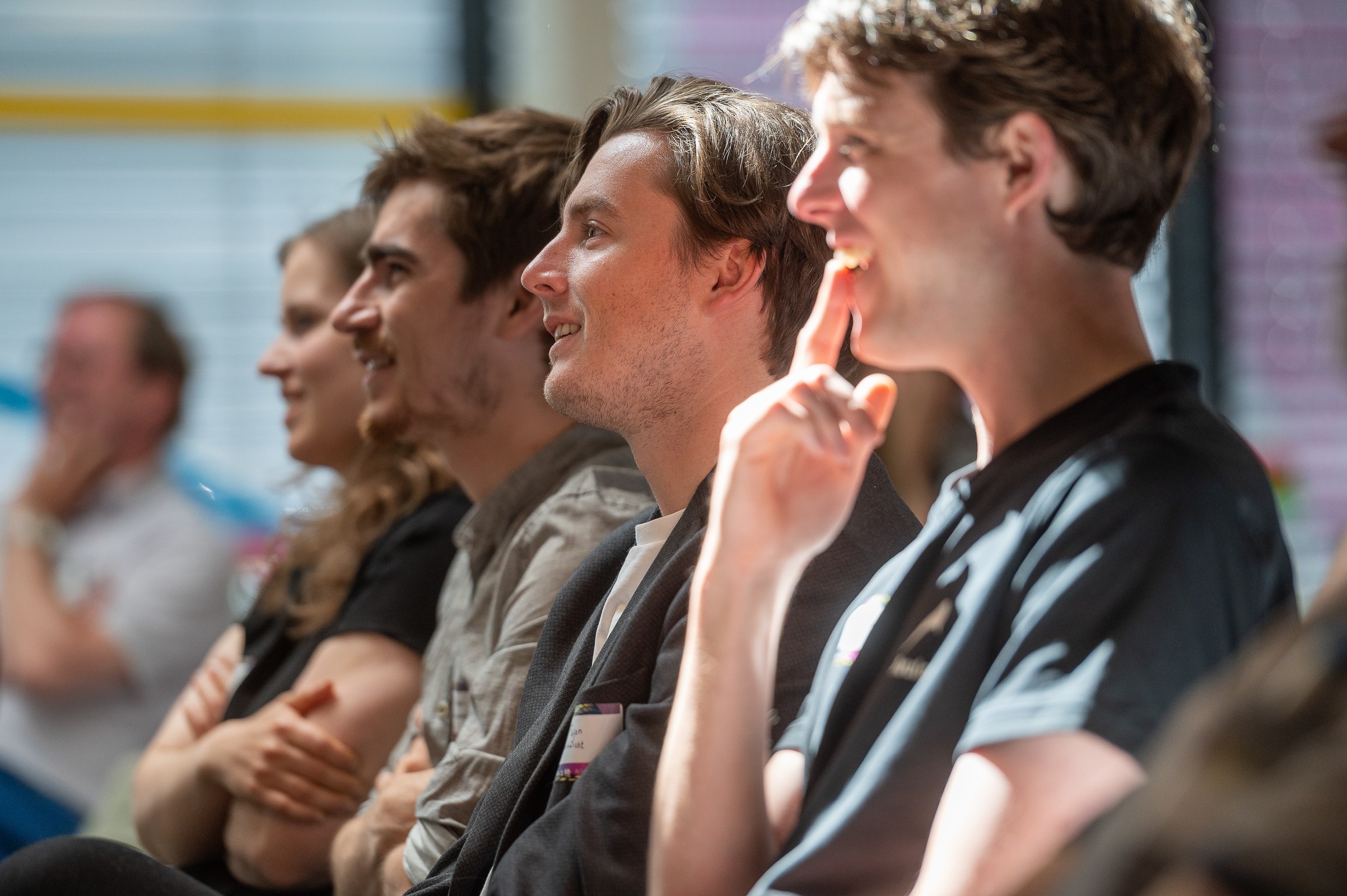

On Wednesday June 15, High Tech NL organized the Artificial Intelligence Scientific Day at the Novio Tech Campus in Nijmegen. During the day, various speakers from universities and companies presented and discussed artificial intelligence and their applications, as well as the ambitions & opportunities for new hardware, such as materials, sensors, architectures, new devices, etc. About 80 people from industry, R&D organizations and universities attended.
After the introduction by moderator Charles Smit (Nexperia and vice chairman High Tech NL), Kees van der Klauw (Manager Dutch AI Coalition) opened the scientific day. He presented the ambitions of the AI coalition and made clear that artificial intelligence should be discussed in connection with the application area in mind, such as health, automotive or agriculture.
After this introduction, Vianney Koelman (Eindhoven University of Technology) gave a lecture on Machine Learning for Scientists and Engineers. With a lot of enthusiasm, he summarized this complex matter in only 30 minutes. While artificial intelligence enables simulation of human behavior with the goal to solve complex problems, he showed that machine learning as a subset of artificial intelligence allows machines to learn from datasets.
Heike Riel (IBM) finished the morning session explaining the future of computing. She showed that artificial intelligence relies on computation power consuming huge amounts of energy. Training an image recognition model, for instance, consumes the same amount of energy for a household in a few weeks, being several hundreds of kilowatt hours. Since this is unsustainable, significant hardware and software innovation is required delivering dedicated hardware to achieve computational scaling.
At the start of the afternoon sessions, the research & innovation agenda within the Dutch ecosystem was highlighted by Stefan Leijnen (Dutch AI coalition). He made clear that concerted actions are required to strengthen our ecosystem. Most important actions are, amongst others, integration of scattered approaches, involvement of societal stakeholders, educating and attracting talents, and stimulating innovation and applications.
In the final presentations, innovations within three application areas were highlighted, i.e., Health (Bram van Ginneken, Radboud University Medical Centre), Automotive Industry (Joep Stokkermans, Nexperia) and Agriculture (Ardjan Zwartjes, Nedap). In these presentations, it became clear that artificial intelligence and machine learning are more than abstract ideas and hypothetical applications. Although there are still many myths around artificial intelligence and machine learning, the technology is maturing and in the market.
In conclusion, the scientific day on artificial intelligence and machine learning, including visions on future research, applications and innovations was very well received by the audience. It not only gave valuable insights in these topics, but it also inspired many of the attendees to think of applications within their businesses.
<Text in Dutch below>
A look back in photos
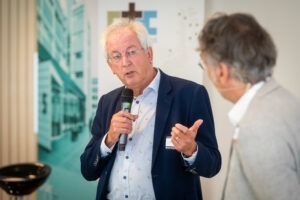 |
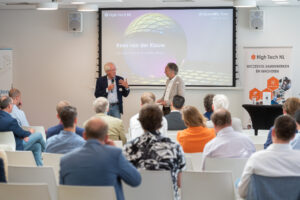 |
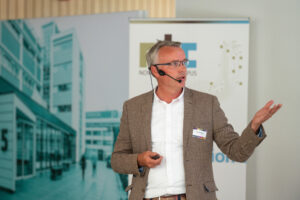 |
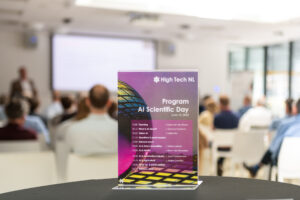 |
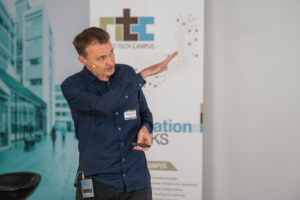 |
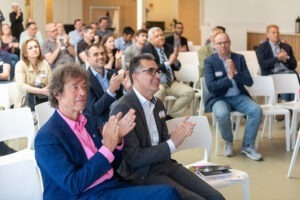 |
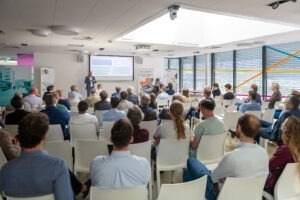 |
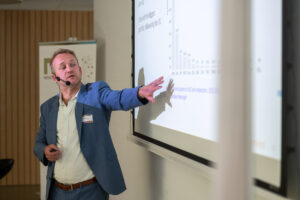 |
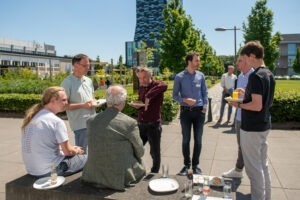 |
More photos via the link below…
Terugblik AI Scientific Day
 Op woensdag 15 juni organiseerde High Tech NL de Artificial Intelligence Scientific Day op de Novio Tech Campus in Nijmegen. Gedurende de dag presenteerden en bespraken verschillende sprekers van universiteiten en bedrijven kunstmatige intelligentie en hun toepassingen, evenals de ambities & kansen voor nieuwe hardware, zoals materialen, sensoren, architecturen, nieuwe apparaten, enz. Ongeveer 80 mensen uit de industrie, R&D-organisaties en universiteiten waren aanwezig.
Op woensdag 15 juni organiseerde High Tech NL de Artificial Intelligence Scientific Day op de Novio Tech Campus in Nijmegen. Gedurende de dag presenteerden en bespraken verschillende sprekers van universiteiten en bedrijven kunstmatige intelligentie en hun toepassingen, evenals de ambities & kansen voor nieuwe hardware, zoals materialen, sensoren, architecturen, nieuwe apparaten, enz. Ongeveer 80 mensen uit de industrie, R&D-organisaties en universiteiten waren aanwezig.
Na de introductie door moderator Charles Smit (Nexperia en vicevoorzitter High Tech NL) opende Kees van der Klauw (Manager Dutch AI Coalition) de wetenschappelijke dag. Hij presenteerde de ambities van de AI-coalitie en maakte duidelijk dat artificiële intelligentie besproken moet worden in samenhang met het toepassingsgebied in het achterhoofd, zoals gezondheid, automotive en landbouw.
Na deze introductie gaf Vianney Koelman (Technische Universiteit Eindhoven) een lezing over machine learning voor wetenschappers en ingenieurs. Met veel enthousiasme vatte hij deze complexe materie in slechts 30 minuten samen. Terwijl kunstmatige intelligentie simulatie van menselijk gedrag mogelijk maakt met als doel complexe problemen op te lossen, toonde hij aan dat machine learning, als een subset van kunstmatige intelligentie, machines in staat stelt te leren van datasets.
Heike Riel (IBM) sloot de ochtendsessie af met uitleg over de toekomst van computers. Ze toonde aan dat kunstmatige intelligentie afhankelijk is van rekenkracht die enorme hoeveelheden energie verbruikt. Het trainen van een beeldherkenningsmodel kost bijvoorbeeld dezelfde hoeveelheid energie voor een huishouden in een paar weken tijd, namelijk enkele honderden kilowatturen. Aangezien dit onhoudbaar is, is er aanzienlijke hardware- en software-innovatie nodig om speciale hardware te leveren om de nodige schaalbaarheid te bereiken.
Aan het begin van de middagsessies werd de onderzoeks- en innovatieagenda binnen het Nederlandse ecosysteem toegelicht door Stefan Leijnen (Nederlandse AI-coalitie). Hij maakte duidelijk dat gezamenlijke acties nodig zijn om ons ecosysteem te versterken. De belangrijkste acties zijn onder meer het integreren van versnipperde benaderingen, het betrekken van maatschappelijke stakeholders, het opleiden en aantrekken van talenten en het stimuleren van innovatie en toepassingen.
In de eindpresentaties werden innovaties binnen drie toepassingsgebieden belicht, namelijk Gezondheidszorg (Bram van Ginneken, Radboud Universitair Medisch Centrum), Automotive (Joep Stokkermans, Nexperia) en Agricultuur (Ardjan Zwartjes, Nedap). In deze presentaties werd duidelijk dat kunstmatige intelligentie en machine learning meer zijn dan abstracte ideeën en hypothetische toepassingen. Hoewel er nog veel mythes rondom kunstmatige intelligentie en machine learning bestaan, is de technologie volwassen en in de markt.
Tot slot: de wetenschappelijke dag over kunstmatige intelligentie en machine learning, inclusief visies op toekomstig onderzoek, toepassingen en innovaties, werd zeer goed ontvangen door het publiek. Het gaf niet alleen waardevolle inzichten in deze onderwerpen, maar het inspireerde ook veel van de aanwezigen om na te denken over toepassingen binnen hun bedrijf.